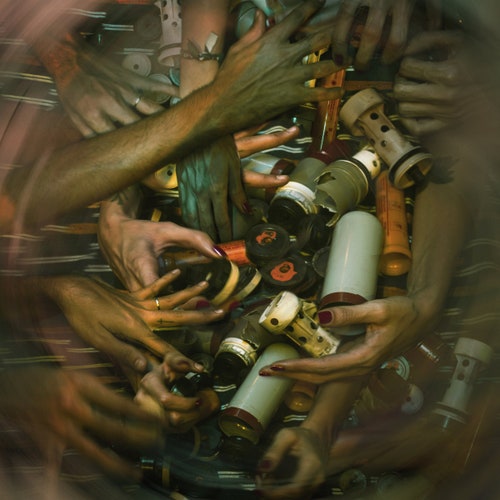Listen to “Dreams of the Imagination” by Sandy Chamoun
On the night of October 17, 2019, Lebanon’s citizens took to the streets to protest widespread corruption, government ineptitude, and crushing austerity measures. “We get nothing we pay for,” a protestor told a reporter. “Our basic needs are not met. Enough! We’re sick of this.” In a nonsectarian display of popular solidarity, more than a million people took part. The atmosphere was hopeful and determined, despite police batons and volleys of tear gas. Within days, the demonstrations succeeded in toppling Prime Minister Saad Hariri and his cabinet. It was a fleeting win for the protestors, however: Not 10 months later, a catastrophic explosion would rip through Beirut’s port, killing nearly 200 people, wounding thousands, and causing billions of dollars in damages. Once again, blame has fallen on government negligence.
Lebanese musician Sandy Chamoun returns to that heady October night in “Dreams of the Imagination,” the first song in a proposed trilogy dedicated to the protests. Chamoun is no stranger to political music; her group the Great Departed frames biting socio-political satire in lilting arrangements for strings, accordion, and tuba. (A sample lyric: “God, the whole world’s gone mad!/I implore you, send us an asteroid.”) But “Dreams of the Imagination” sounds nothing like the Great Departed’s quixotic cabaret music. It draws instead from ambient, industrial, shoegaze, and noise.
In a text accompanying the song, Chamoun writes of the rush of sensations she experienced that night, and the song seemingly channels that same energy. Over a steady drumbeat, overdriven feedback glows like embers as Chamoun sings of a crowd of people flocking to the streets, their eyes brightening. The looping beat sounds like it may have been sampled from exploding tear-gas canisters; the midrange is a crimson fog of shouts and street noise. Halfway through, a distorted sample of a soaring reed melody glitches and stutters—an allegory, perhaps, for the way that progress moves in fits and starts. At once mournful yet defiant, Chamoun reels off a list of images in a hypnotic voice, ending each line in the word “fantasy”: “The people are a fantasy/The light is a fantasy/The streets are a fantasy/Solitude is a fantasy…” She casts her net wider and wider as the chaos intensifies, touching upon bullets, blood, betrayal, and longing.
The song’s final minute is an all-out barrage upon the senses. Chamoun sings, “The dust is a fantasy/Death is a fantasy/The tears are a fantasy/Eternity is a fantasy.” And then, after a climax of explosive percussion and a final melisma, the song falls silent. It’s an overwhelming and cathartic piece of music, one that captures the feeling Chamoun expresses in her written account of the night’s events: “I have to see everything, retain all the scenes so that I never forget it. The impossible has finally come true.”
